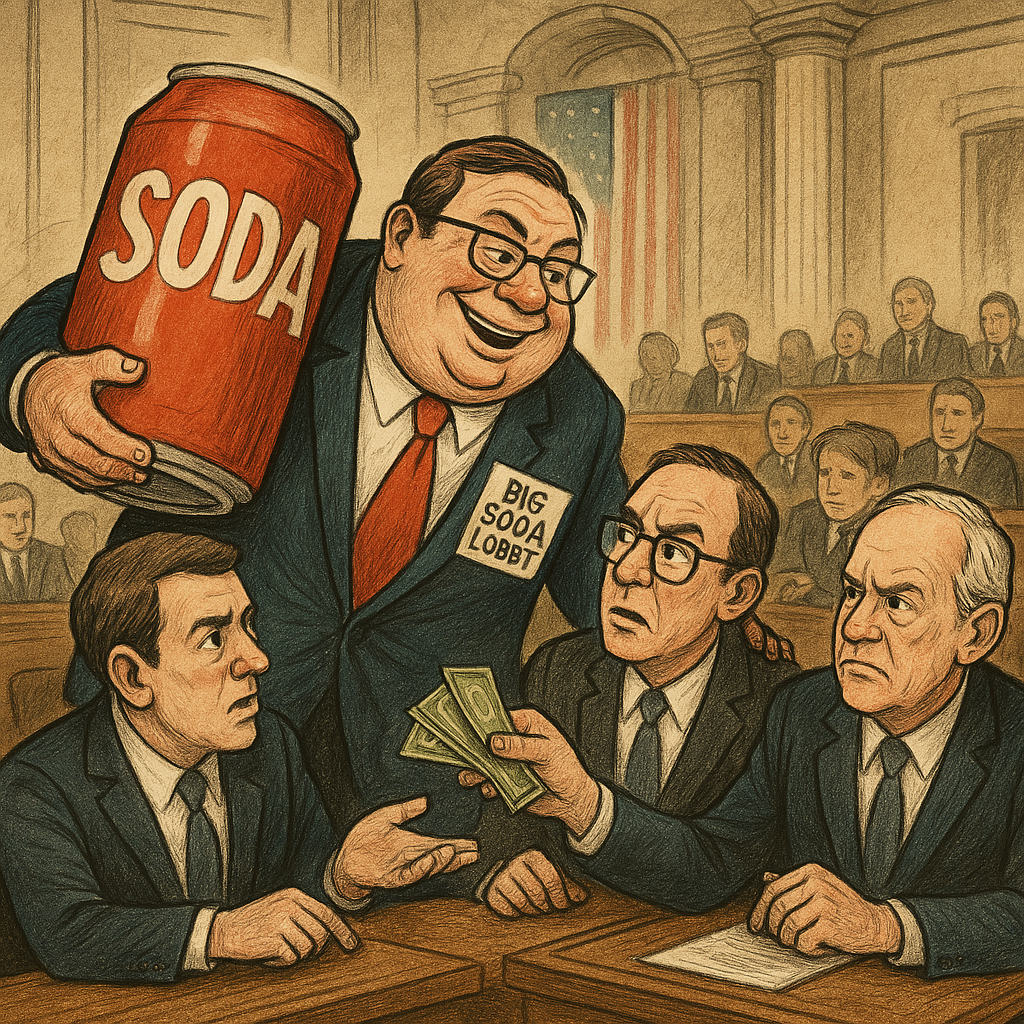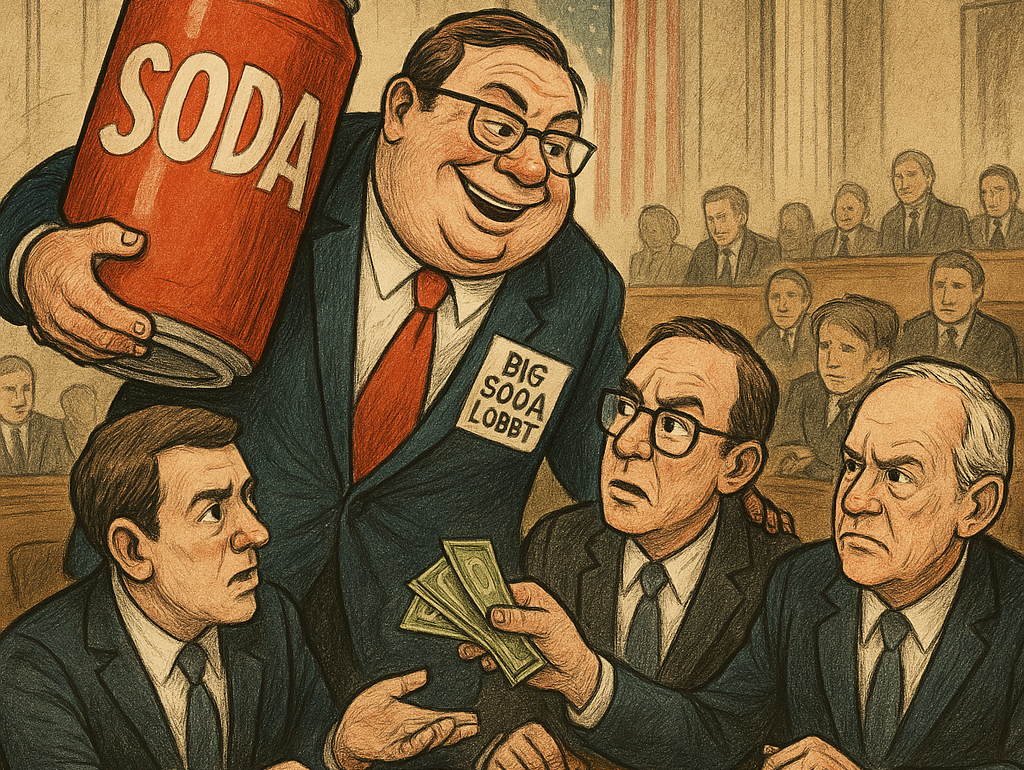
West Virginia Governor Patrick Morrisey’s bold push to transform public health policy has sparked a fierce reaction — not just from within the political establishment, but from one of the most powerful lobbies in the country: the soda industry.
At a landmark event unveiling the “Four Pillars of a Healthy West Virginia,” Morrisey stood before students, legislators, and health officials — including U.S. Health and Human Services Secretary Robert F. Kennedy Jr. — and announced a sweeping health initiative aimed at cleaning up food systems, promoting exercise, expanding work requirements for food assistance, and reorienting SNAP benefits to favor nutritious food.
But behind the scenes, not everyone is applauding.
“These men and women, your leaders, are getting calls every day from the big soda companies,” Secretary Kennedy told the crowd. “They’re telling them they’re making a big mistake. They’re threatening to stop writing checks, to run candidates against them, to destroy their political careers.”
Soda Lobby Fights Back
The most controversial piece of the governor’s plan is a proposed federal waiver that would remove soda as an eligible item under SNAP, the Supplemental Nutrition Assistance Program. Morrisey framed the move as a commonsense step to align taxpayer-funded benefits with the program’s stated purpose: nutrition.
“SNAP stands for Supplemental Nutrition Assistance Program,” Morrisey said. “That ‘N’ is for nutrition — not nonsense.”
Kennedy, echoing the governor’s sentiment, criticized the soda industry’s efforts to redefine SNAP’s intent.
“Governor Morrisey told me the soda companies came in and said, ‘You need to be educated about this — food stamps aren’t a nutrition program.’ And he said, ‘Is there anything nutritious in this Diet Coke I’m holding?’ They admitted, ‘No, of course not.’”
A Familiar Playbook
Kennedy compared the soda industry’s tactics to those of Big Tobacco in the 1980s and ’90s, recounting how tobacco companies — facing public backlash — began buying up food companies and deploying scientists to engineer food products that were more addictive.
“They added softeners so people would chew less and overeat,” Kennedy explained. “They loaded products with sugar, which is as addictive as crack. And now, like Big Tobacco before them, they’re flooding into statehouses to block reform.”
The parallels were not lost on West Virginia lawmakers. Delegate Jason Barrett, a key architect of the food dye ban recently passed in the legislature, recounted the warnings he received:
“People told me, ‘Jason, Big Food and Big Drink are going to come after you.’ And my response was simple: ‘Big deal.’ The people of West Virginia are worth it.”
Legislators Under Pressure
Multiple state lawmakers, including Chairwoman Laura Chapman and Health Committee Chair Evan Worrell, confirmed they had been lobbied hard by soda and processed food companies. But they made clear they weren’t backing down.
“We recognize that a strong and prosperous West Virginia starts with the health of our families,” Worrell said. “And we are just getting started.”
Chapman added that 27% of West Virginians live in food deserts and emphasized the moral imperative of the reforms. “We’re here for the children,” she said. “They’re our future.”
A Movement Begins
Secretary Kennedy, in one of the most pointed moments of the day, issued a challenge to other governors across the nation:
“Get in line behind Governor Morrisey. Apply for a waiver to my agency, and we’ll give it to you. That’s how we make America healthy again.”
He warned that soda and food lobbyists are terrified — not of federal pressure, but of having to make “special products” for states like West Virginia and California that are beginning to outlaw harmful food additives.
The Stakes Are High
As Morrisey concluded the event, he reminded the audience that this is more than just policy — it’s about the future of the state.
“We’re not just climbing mountains in West Virginia. We’re moving them.”
With industry giants mobilizing against him, Governor Morrisey has made it clear: West Virginia is ready to lead the charge toward a healthier future — even if that means standing toe-to-toe with Big Soda.
Sidebar: What the SNAP Waiver Would Do
- Remove soda and sugar-laden beverages from SNAP eligibility.
- Encourage the use of benefits for fruits, vegetables, lean meats, and whole foods.
- Introduce “Healthy Bundles” to simplify nutritious choices for families.
Public Response:
- Polls show strong grassroots support across West Virginia, especially among parents and educators.
- Activists from the “Maha Moms” movement have been key in raising awareness and lobbying lawmakers.
- Industry groups are expected to mount legal and political challenges to delay or block implementation.
The battle lines are drawn. Now the question is: who will win — the people of West Virginia, or Big Soda?
For updates on the waiver process and legislation, visit governor.wv.gov.


